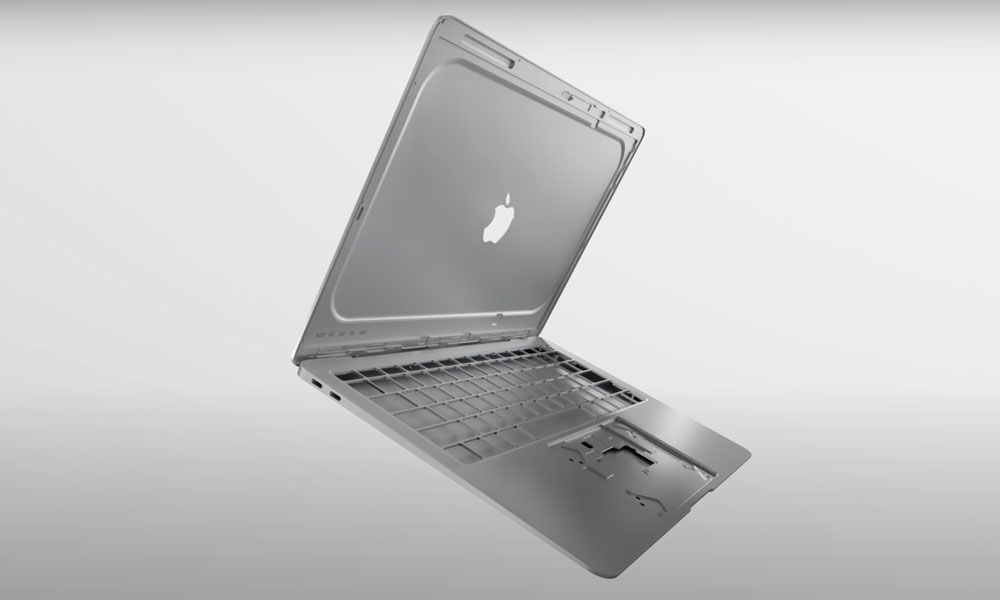Surprise! Your MacBook Is Actually Made from Recycled Beer Cans
 Credit: Apple
Credit: Apple
Toggle Dark Mode
Even though it sometimes leads to controversial decisions, there’s no arguing that Apple has a much stronger commitment to environmental responsibility than almost any other big tech company out there, but a recent series of patents are showing just how far the company goes in its efforts to reduce its environmental impact.
If you’ve been paying attention, you’re probably already aware that Apple uses recycled aluminum to build the uni-body enclosures of its MacBooks. In fact, Apple made quite a big deal of it back in 2018, when it announced that its 2018 MacBook Air was being made from 100% recycled aluminum, reducing its carbon footprint by 50 percent. The revelation was met with thunderous applause by the assembled crowd, as Apple declared it “The Greenest Mac Ever.”
To accomplish this, we invented a new custom alloy. It’s designed to use fine shavings of recaptured aluminum that are re-engineered down to the atomic level. This new alloy is as beautiful and robust as any we’ve used before, and it makes MacBook Air the greenest Mac ever.
Apple’s 2018 MacBook Air Intro
At the time, however, Apple didn’t go into any particular detail about where this “recaptured aluminum” came from. On stage, Apple’s VP of Hardware Engineering, Laura Legros, simply said that it used “excess aluminum from the production process.” This implied that all the raw materials came from within Apple, rather than drawing aluminum from elsewhere.
While that may have been true at the time, a new set of patent applications discovered by Patently Apple reveal that Apple has been recycling aluminum from a wide variety of sources — including pop and beer can scrap.
In fact, one of the two patent applications, 20210087664, is actually titled Heat-Treatable Aluminum Alloy Made From Used Beverage Can Scrap, and described the methods used to incorporate scrap aluminum from beer cans and pop cans into Apple’s special custom alloy.
Now, to be fair, there’s a lot more to Apple’s alloy than simply beer can aluminum, and as both patents describe, other recycled materials are incorporated to produce the final metal, which as any MacBook owner knows is definitely more substantial and impressive than your average beer can.
The patent applications explain the difficulty in making a “cosmetic” aluminum from recycled material, such as used beverage can (UBC) scrap, which is why it’s only part of the bigger picture that includes a surface layer and a substrate. The surface layer provides the “cosmetic appeal” — that is, the nicer finish that we’re all used to having on our MacBooks — while the substrate uses the UBC scrap. It’s this latter part that allows Apple to get to its goal of using 100 percent recycled aluminum.
Essentially, Apple is using higher-quality recycled aluminum in those areas where it’s most important, but since that material would be in short supply, the much more common scrap aluminum from beer cans and pop cans is used to make up the difference.
To put this in perspective, the U.S. Environmental Protection Agency (EPA) estimates that in 2018 alone, 50.4 percent — or 0.67 million tons — of recycled aluminum came from beer and soft drink cans.
So, it makes sense that, as the patent applications describe, the custom alloy that Apple uses in its products is designed to incorporate very high levels of UBC scrap, and there are a number of other advanced metallurgical engineering techniques that are used to form the alloy, as well as allowing for cladding on the surface layer for an even better cosmetic finish.
While there are many advanced techniques described in both patent applications that will be of interest only to metallurgical engineers and science nerds, at the end of the day they demonstrate the level of consideration and effort that Apple puts into making its products as environmentally responsible as possible. It’s something to think about the next time you pop open a can of beer while you’re working away on your MacBook.






